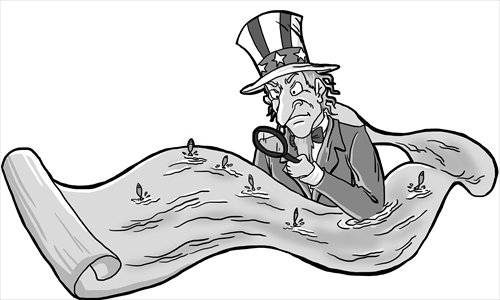US expertise gives it powerful role in maritime politics

Counterpoint: American scholarship on South China Sea misguided
The US has held many seminars on the history of the South China Sea. US scholars are familiar with relevant historical data. It's true that China has plenty of historical records of activities in the South China Sea. However, many relevant historical documents can be found in US libraries.
Decades ago, afraid of the devastation of war, some Chinese people transported many historical documents to developed countries, especially the US. The US has been collecting documents without interruption. Therefore, we cannot say that US scholars know little about the history in the South China Sea.
The reason why US scholars don't want to talk about this is not that they lack basic knowledge of this area, but that many archival records are not in the interests of the US. China has an advantage over other countries in the South China Sea in the records of its activities in historical documents. Therefore, although it seems that the US has taken a neutral position, in fact it is biased against China.
But the US has not got involved into the specific legal issues. Until now there have only been some diplomatic statements from the US. Of course, we oppose any external intervention. However, we cannot come to the conclusion that the US work in this area is illegal or that it doesn't conform to accepted international practice.
If China and the Philippines, or China and Japan, refer their territorial disputes to arbitration by international tribunal or a UN expert group, the article in the International Maritime Law, which mentions that a third country should be invited before its mediation of disputes, will become operative. At present, territorial disputes haven't been taken to the court. Although we don't welcome external interventions, we can neither say that these interventions are illegal nor allege that the US is short of experts who know international maritime law. This argument misses the point.
The US is just waiting and seeing. It hopes that the South China Sea issue can be a lever of its "back to Asia" strategy. But at the same time, it doesn't want the situation to run out of control. The US will not benefit if there is a real conflict in the South China Sea.
It just wants to strengthen its ability to regulate affairs and prove its leading regional role by this means. Neither war nor peace is in accordance with the interests of the US. Therefore it is difficult to gauge whether US actions are less than positive. The US just wants to use this process to contain China and maintain its leading role in the world.
We should analyze US involvement in a broad sense of grand strategy. The US knows that China is rising and exerting more influence in surrounding areas. It is very difficult for US to contain China at this time. So the US pretends that it is upholding justice and trying to arbitrate the disputes to demonstrate that the US is indispensable. This is the crux of the matter.
The US has plenty of knowledge of oceans in the Asia-Pacific region, including the South China Sea. In fact, the US has more relevant experts than China, even more than most of the Asian countries. The US influence has been present in the South China Sea region for a long time.
We cannot underestimate the US capability to stir up trouble and unrest in the South China Sea area. It doesn't mean that there will be confrontation between China and the US immediately.
However, we must realize that there's a huge shadow of the US behind the territorial disputes between China and other countries.
The article was compiled by Global Times reporter Shu Meng based on an interview with Wang Yizhou, professor and vice dean of School of International Studies at Peking University. shumeng@globaltimes.com.cn